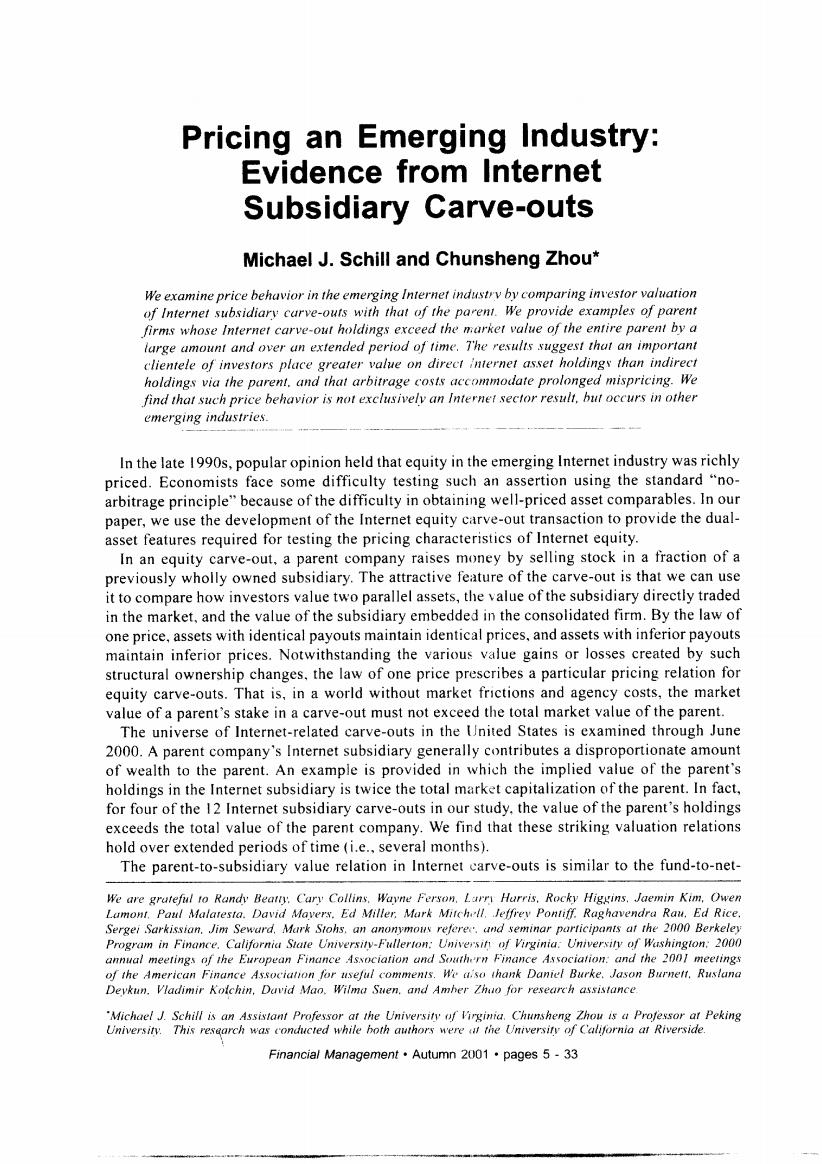正在加载图片...

Pricing an Emerging Industry: Evidence from Internet Subsidiary Carve-outs Michael J.Schill and Chunsheng Zhou* We examine price behavior in the emerging Internet industry by comparing investor valuation of Internet subsidiary curve-outs with that of the parent.We provide examples of parent firms whose Internet carve-out holdings exceed the market value of the entire parent by a large umount and over an extended period of time.The results suggest thut an important clientele of investors place greater value on direct internet asset holdings than indirect holdings via the parent.and that arbitrage costs accommodate prolonged mispricing.We find that such price behavior is not exclusively an Internet sector result.but occurs in other emerging industries. In the late 1990s,popular opinion held that equity in the emerging Internet industry was richly priced.Economists face some difficulty testing such an assertion using the standard "no- arbitrage principle"because of the difficulty in obtaining well-priced asset comparables.In our paper,we use the development of the Internet equity carve-out transaction to provide the dual- asset features required for testing the pricing characteristics of Internet equity. In an equity carve-out,a parent company raises money by selling stock in a fraction of a previously wholly owned subsidiary.The attractive feature of the carve-out is that we can use it to compare how investors value two parallel assets,the value of the subsidiary directly traded in the market,and the value of the subsidiary embedded in the consolidated firm.By the law of one price,assets with identical payouts maintain identical prices,and assets with inferior payouts maintain inferior prices.Notwithstanding the various value gains or losses created by such structural ownership changes,the law of one price prescribes a particular pricing relation for equity carve-outs.That is,in a world without market frictions and agency costs,the market value of a parent's stake in a carve-out must not exceed the total market value of the parent. The universe of Internet-related carve-outs in the United States is examined through June 2000.A parent company's Internet subsidiary generally contributes a disproportionate amount of wealth to the parent.An example is provided in which the implied value of the parent's holdings in the Internet subsidiary is twice the total market capitalization of the parent.In fact, for four of the 12 Internet subsidiary carve-outs in our study,the value of the parent's holdings exceeds the total value of the parent company.We find that these striking valuation relations hold over extended periods of time (i.e.,several months). The parent-to-subsidiary value relation in Internet carve-outs is similar to the fund-to-net- We are gruteful to Randy Beatty.Cary Collins.Wayne Ferson.Larr Hurris,Rocky Higgins.Jaemin Kim,Owen Lumont.Paul Malaresta.David Mavers.Ed Miller.Mark Mitchell.Jeffrey Pontiff.Raghavendra Rau.Ed Rice. Sergei Sarkissian.Jim Sewurd.Mark Stohs,an anonymous referee.und seminar participants at the 2000 Berkeley Program in Finance.California State University-Fullerton:Universin of Virginia:University of Wushington:2000 annual meetings of the European Finance Asxociation and Southern Finance Association:and the 2001 meelings of the American Finance Association for useful comments.We a.so thank Daniel Burke.Jason Burnett.Ruslana Devkun.Vladimir Kolchin,Duvid Mao.Wilma Suen.and Amher Zhuo for research assistance. 'Michael J.Schill is an Assistant Professor at the University of Virginia.Chunsheng Zhou is a Professor at Peking Universitv.This resaarch was conducted while hoth authors were ut the University of California at Riverside. Financial Management.Autumn 2001.pages 5-33